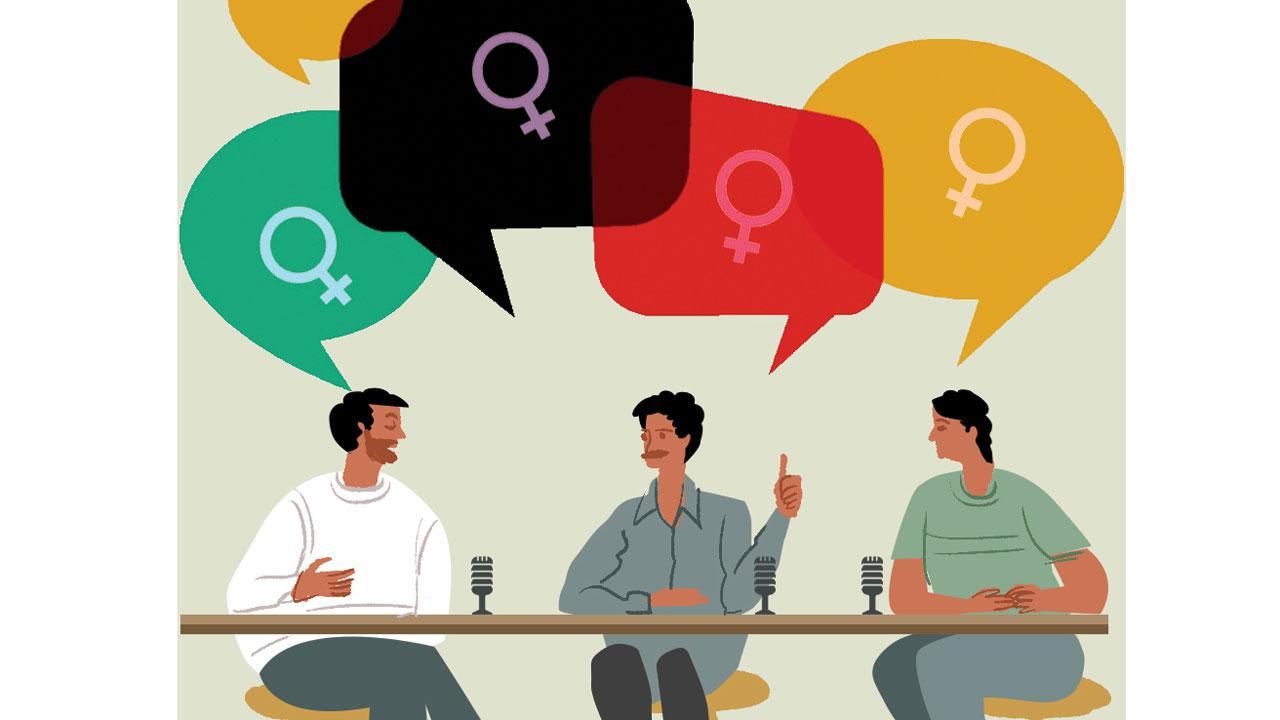What prevents someone claiming to be a political thinker a chance to deepen their political understanding?

Illustration/Uday Mohite
![]() Every now and then Google docs circulate, in which women are asked to nominate themselves, or other women, as potential panelists. These are intended as a response to the ubiquity of that adamant cultural institution, The Manel (a panel composed solely of men). These efforts are often accompanied by the glow of good intentions. But good intentions are not the same as political intentions.
Every now and then Google docs circulate, in which women are asked to nominate themselves, or other women, as potential panelists. These are intended as a response to the ubiquity of that adamant cultural institution, The Manel (a panel composed solely of men). These efforts are often accompanied by the glow of good intentions. But good intentions are not the same as political intentions.
ADVERTISEMENT
These lists may be better than nothing. But they also absolve people of the uncomfortable work of interrogating their own biases or privileges and the work of expanding their world view. Organisers called out about manels, are always hurt and innocent. “Us? Sexist? Arre we looked for women, but we found none. Well, we found one but she was busy and how can we take time from glorifying the talents of men, to look for, ohemgee, more woman?”
Recently, the self-described liberal, secular content creator The Deshbhakt was criticised for some sexualised memes of Kangana Ranaut dancing to mock her recent, already meme-ready interview. Their response to the criticism was a sarcastic faux apology for having pissed off women from the IT cell of the right wing. As if by virtue of being leftist you cannot possibly be sexist—or questioned. What prevents someone claiming to be a political thinker a chance to deepen their political understanding?
The recently published Justice Hema Committee report unmuted a public secret: the sexism, misogyny and sexual violence in the Malyalam film industry. So deeply is this power entrenched that the committee members had to type all 235 pages of the report themselves because no stenographer could be trusted not to leak the report to powerful actors and directors who might move to suppress it. So little does this world think about women as colleagues, that women don’t even have enough toilets here. Now, the biggest directors and actors are accused of rape and resigning their positions from industry bodies, including the actor Mohanlal who, in 2018, reinstated the actor Dileep, accused of conspiring to have a female colleague raped, even while the case is ongoing. Women—in cinema, in journalism—labored to make this happen. Like those google docs.
Hero worship props up these worlds. It elevates men to supremacy, more than just talented humans. Dada, guru, boss. Even as I read piece upon piece about the report, my social media feed pulses with fanboy excess. I don’t mean fans who bay for Arshad Warsi’s blood when he comments on Prabhas. I mean self-proclaimed irreverent content creator dudes interviewing other irreverent dudes in cinema. The same men over and over—Pankaj Tripathi, Nawazuddin Siddique, Anurag Kashyap, Dibakar Banerjee. Sure they are accomplished artists, but the alternative to mainstream men, is always, well, alternative men. When will masculine interviewers challenge their own received notions of greatness and interview women in the arts as thinkers?
Not interviewing women or having them on panels never comes in the way of any one’s success, so they keep right on not interviewing them. If these creators looked at the list of people they have interviewed and asked the question: kitni auratein thi?, they would not only come up with a paltry number. They would come up with proof of their very limited world view, which contributes to the hero-worshipping culture which keeps elite men at the centre, and marginalises many interesting others.
Paromita Vohra is an award-winning Mumbai-based filmmaker, writer and curator working with fiction and non-fiction. Reach her at [email protected]
 Subscribe today by clicking the link and stay updated with the latest news!" Click here!
Subscribe today by clicking the link and stay updated with the latest news!" Click here!







